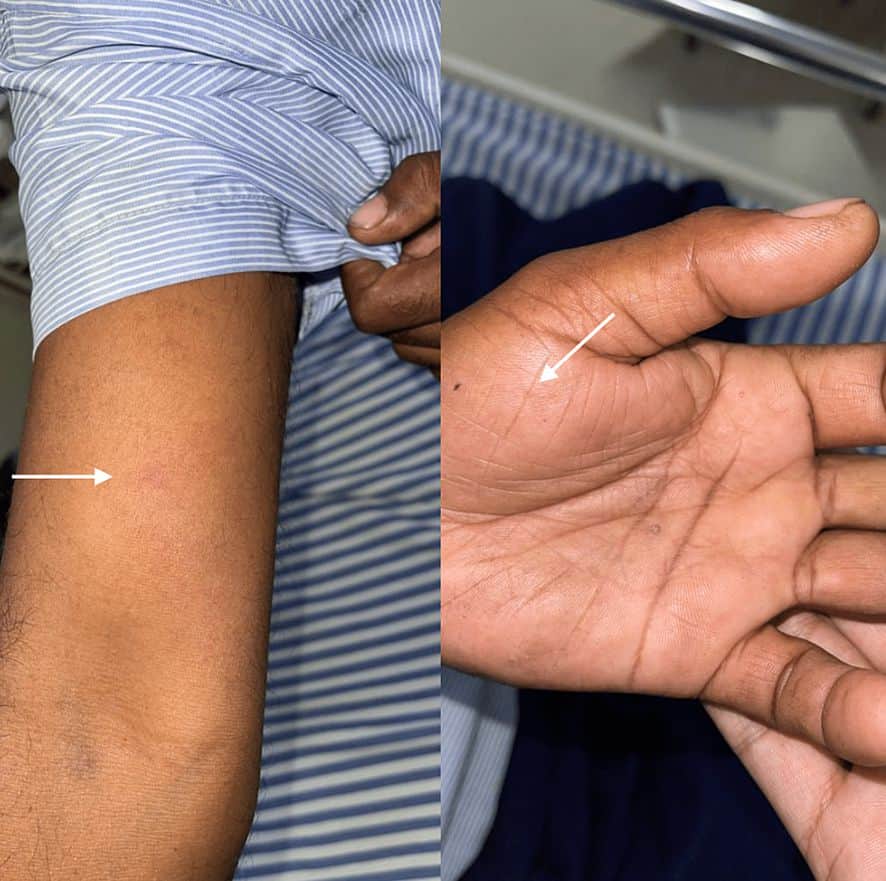A farmer, 49, was working in his fields when a honeybee stung him on hand and sent him into a stroke. Where he was bitten, on his right arm and left palm, it became “painful” and “tender.” However, around five hours later, he had a seizure and lost the ability to use his left side.
A bee sting can cause a dangerous allergic reaction called anaphylaxis. However, sting venom may be directly responsible.
The new case study, published in the journal Cureus, explains that bee venom induces a “increase in cytokines.” It said that this can have “negative consequences” on the brain.
Cytokines contribute to the inflammatory response. When activated, they send a signal to the body’s immune system to begin protecting you. But if there are too many chemicals, they might soon become dangerous.
The man was hospitalized in Maharashtra, India, and had various brain scans.
They showed signs of an ischemic stroke, including reduced blood flow to a significant portion of his brain.

Injections of antibiotics, blood thinners, and medications to lessen his seizure activity were used to treat him.
His brain improved and he resumed his activities after receiving therapy for six months.
“Strokes and other neurological conditions,” according to the author of the study, “linked to bee venom are extremely uncommon.”
“In such situations, if the presenting symptoms are severe,” the author added, “there is a chance of an ischaemic stroke, which may consist of generalized… seizures. Such situations ought to be handled carefully and without further delay.”
Even if you have been stung previously, an allergic response may still occur, as one doctor learned the hard way when his uncle died after being bitten by a bee.
Surprisingly, just because someone was stung once and didn’t have a big reaction doesn’t mean they will be fine the next time.
Because the body becomes sensitized to an allergen after the first exposure, a subsequent sting may cause a more severe response. Those who have a severe allergic response to a bee sting have a 25% to 65% probability of developing anaphylaxis the following time they are bitten.
A recent study in the World Allergy Organization Journal showed that beekeepers, who you might think would be safe from bee stings, are more likely to die from one.
People who had been stung more than five times were more likely to have anaphylaxis.
The following symptoms can lead to anaphylactic shock, according to the US Center for Disease Control (CDC):
- Getting weak all of a sudden (caused by a drop in blood pressure)
- Dizziness
- A feeling of dread or fear
- A fast pulse
- The throat and airways swell, making it harder to breathe.
- Extreme asthma
- Itching and swelling away from the stung location Stomach cramps and/or a sense of nausea
Signs of a stroke
The word FAST is the best way to remember the signs of a stroke.
F = Face Drooping – Does one side of the face droop or is it numb? Ask the person to smile. Is the person’s smile uneven?
A = Arm Weakness – Is one arm weak or numb? Ask the person to raise both arms. Does one arm drift downward?
S = Speech Difficulty – Is speech slurred?
T = Time to call 911
Image Credit: KHALED DESOUKI/AFP via Getty Images